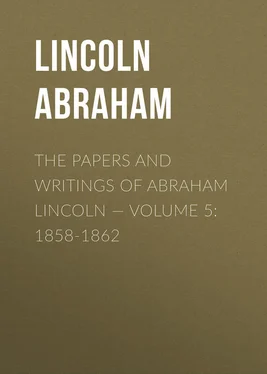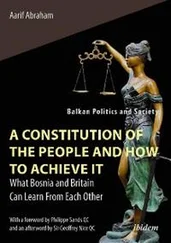Abraham Lincoln - The Papers And Writings Of Abraham Lincoln — Volume 5 - 1858-1862
Здесь есть возможность читать онлайн «Abraham Lincoln - The Papers And Writings Of Abraham Lincoln — Volume 5 - 1858-1862» — ознакомительный отрывок электронной книги совершенно бесплатно, а после прочтения отрывка купить полную версию. В некоторых случаях можно слушать аудио, скачать через торрент в формате fb2 и присутствует краткое содержание. Жанр: foreign_antique, foreign_prose, на английском языке. Описание произведения, (предисловие) а так же отзывы посетителей доступны на портале библиотеки ЛибКат.
- Название:The Papers And Writings Of Abraham Lincoln — Volume 5: 1858-1862
- Автор:
- Жанр:
- Год:неизвестен
- ISBN:нет данных
- Рейтинг книги:4 / 5. Голосов: 1
-
Избранное:Добавить в избранное
- Отзывы:
-
Ваша оценка:
- 80
- 1
- 2
- 3
- 4
- 5
The Papers And Writings Of Abraham Lincoln — Volume 5: 1858-1862: краткое содержание, описание и аннотация
Предлагаем к чтению аннотацию, описание, краткое содержание или предисловие (зависит от того, что написал сам автор книги «The Papers And Writings Of Abraham Lincoln — Volume 5: 1858-1862»). Если вы не нашли необходимую информацию о книге — напишите в комментариях, мы постараемся отыскать её.
The Papers And Writings Of Abraham Lincoln — Volume 5: 1858-1862 — читать онлайн ознакомительный отрывок
Ниже представлен текст книги, разбитый по страницам. Система сохранения места последней прочитанной страницы, позволяет с удобством читать онлайн бесплатно книгу «The Papers And Writings Of Abraham Lincoln — Volume 5: 1858-1862», без необходимости каждый раз заново искать на чём Вы остановились. Поставьте закладку, и сможете в любой момент перейти на страницу, на которой закончили чтение.
Интервал:
Закладка:
Turn it, and contemplate it in another view. He says that, according to his popular sovereignty, the General Government may give to the Territories governors, judges, marshals, secretaries, and all the other chief men to govern them, but they, must not touch upon this other question. Why? The question of who shall be governor of a Territory for a year or two, and pass away, without his track being left upon the soil, or an act which he did for good or for evil being left behind, is a question of vast national magnitude; it is so much opposed in its nature to locality that the nation itself must decide it: while this other matter of planting slavery upon a soil, — a thing which, once planted, cannot be eradicated by the succeeding millions who have as much right there as the first comers, or, if eradicated, not without infinite difficulty and a long struggle, he considers the power to prohibit it as one of these little local, trivial things that the nation ought not to say a word about; that it affects nobody save the few men who are there.
Take these two things and consider them together, present the question of planting a State with the institution of slavery by the side of a question who shall be Governor of Kansas for a year or two, and is there a man here, is there a man on earth, who would not say the governor question is the little one, and the slavery question is the great one? I ask any honest Democrat if the small, the local, and the trivial and temporary question is not, Who shall be governor? while the durable, the important, and the mischievous one is, Shall this soil be planted with slavery?
This is an idea, I suppose, which has arisen in Judge Douglas's mind from his peculiar structure. I suppose the institution of slavery really looks small to him. He is so put up by nature that a lash upon his back would hurt him, but a lash upon anybody else's back does not hurt him. That is the build of the man, and consequently he looks upon the matter of slavery in this unimportant light.
Judge Douglas ought to remember, when he is endeavoring to force this policy upon the American people, that while he is put up in that way, a good many are not. He ought to remember that there was once in this country a man by the name of Thomas Jefferson, supposed to be a Democrat, — a man whose principles and policy are not very prevalent amongst Democrats to-day, it is true; but that man did not take exactly this view of the insignificance of the element of slavery which our friend judge Douglas does. In contemplation of this thing, we all know he was led to exclaim, "I tremble for my country when I remember that God is just!" We know how he looked upon it when he thus expressed himself. There was danger to this country, — danger of the avenging justice of God, in that little unimportant popular sovereignty question of judge Douglas. He supposed there was a question of God's eternal justice wrapped up in the enslaving of any race of men, or any man, and that those who did so braved the arm of Jehovah; that when a nation thus dared the Almighty, every friend of that nation had cause to dread his wrath. Choose ye between Jefferson and Douglas as to what is the true view of this element among us.
There is another little difficulty about this matter of treating the Territories and States alike in all things, to which I ask your attention, and I shall leave this branch of the case. If there is no difference between them, why not make the Territories States at once? What is the reason that Kansas was not fit to come into the Union when it was organized into a Territory, in Judge Douglas's view? Can any of you tell any reason why it should not have come into the Union at once? They are fit, as he thinks, to decide upon the slavery question, — the largest and most important with which they could possibly deal: what could they do by coming into the Union that they are not fit to do, according to his view, by staying out of it? Oh, they are not fit to sit in Congress and decide upon the rates of postage, or questions of ad valorem or specific duties on foreign goods, or live-oak timber contracts, they are not fit to decide these vastly important matters, which are national in their import, but they are fit, "from the jump," to decide this little negro question. But, gentlemen, the case is too plain; I occupy too much time on this head, and I pass on.
Near the close of the copyright essay, the judge, I think, comes very near kicking his own fat into the fire. I did not think, when I commenced these remarks, that I would read that article, but I now believe I will:
"This exposition of the history of these measures shows conclusively that the authors of the Compromise measures of 1850 and of the Kansas-Nebraska Act of 1854, as well as the members of the Continental Congress of 1774., and the founders of our system of government subsequent to the Revolution, regarded the people of the Territories and Colonies as political communities which were entitled to a free and exclusive power of legislation in their provisional legislatures, where their representation could alone be preserved, in all cases of taxation and internal polity."
When the judge saw that putting in the word "slavery" would contradict his own history, he put in what he knew would pass synonymous with it, "internal polity." Whenever we find that in one of his speeches, the substitute is used in this manner; and I can tell you the reason. It would be too bald a contradiction to say slavery; but "internal polity" is a general phrase, which would pass in some quarters, and which he hopes will pass with the reading community for the same thing.
"This right pertains to the people collectively, as a law-abiding and peaceful community, and not in the isolated individuals who may wander upon the public domain in violation of the law. It can only be exercised where there are inhabitants sufficient to constitute a government, and capable of performing its various functions and duties, — a fact to be ascertained and determined by" who do you think? Judge Douglas says "by Congress!" "Whether the number shall be fixed at ten, fifteen or twenty thousand inhabitants, does not affect the principle."
Now, I have only a few comments to make. Popular sovereignty, by his own words, does not pertain to the few persons who wander upon the public domain in violation of law. We have his words for that. When it does pertain to them, is when they are sufficient to be formed into an organized political community, and he fixes the minimum for that at ten thousand, and the maximum at twenty thousand. Now, I would like to know what is to be done with the nine thousand? Are they all to be treated, until they are large enough to be organized into a political community, as wanderers upon the public land, in violation of law? And if so treated and driven out, at what point of time would there ever be ten thousand? If they were not driven out, but remained there as trespassers upon the public land in violation of the law, can they establish slavery there? No; the judge says popular sovereignty don't pertain to them then. Can they exclude it then? No; popular sovereignty don't pertain to them then. I would like to know, in the case covered by the essay, what condition the people of the Territory are in before they reach the number of ten thousand?
But the main point I wish to ask attention to is, that the question as to when they shall have reached a sufficient number to be formed into a regular organized community is to be decided "by Congress." Judge Douglas says so. Well, gentlemen, that is about all we want. No, that is all the Southerners want. That is what all those who are for slavery want. They do not want Congress to prohibit slavery from coming into the new Territories, and they do not want popular sovereignty to hinder it; and as Congress is to say when they are ready to be organized, all that the South has to do is to get Congress to hold off. Let Congress hold off until they are ready to be admitted as a State, and the South has all it wants in taking slavery into and planting it in all the Territories that we now have or hereafter may have. In a word, the whole thing, at a dash of the pen, is at last put in the power of Congress; for if they do not have this popular sovereignty until Congress organizes them, I ask if it at last does not come from Congress? If, at last, it amounts to anything at all, Congress gives it to them. I submit this rather for your reflection than for comment. After all that is said, at last, by a dash of the pen, everything that has gone before is undone, and he puts the whole question under the control of Congress. After fighting through more than three hours, if you undertake to read it, he at last places the whole matter under the control of that power which he has been contending against, and arrives at a result directly contrary to what he had been laboring to do. He at last leaves the whole matter to the control of Congress.
Читать дальшеИнтервал:
Закладка:
Похожие книги на «The Papers And Writings Of Abraham Lincoln — Volume 5: 1858-1862»
Представляем Вашему вниманию похожие книги на «The Papers And Writings Of Abraham Lincoln — Volume 5: 1858-1862» списком для выбора. Мы отобрали схожую по названию и смыслу литературу в надежде предоставить читателям больше вариантов отыскать новые, интересные, ещё непрочитанные произведения.
Обсуждение, отзывы о книге «The Papers And Writings Of Abraham Lincoln — Volume 5: 1858-1862» и просто собственные мнения читателей. Оставьте ваши комментарии, напишите, что Вы думаете о произведении, его смысле или главных героях. Укажите что конкретно понравилось, а что нет, и почему Вы так считаете.












